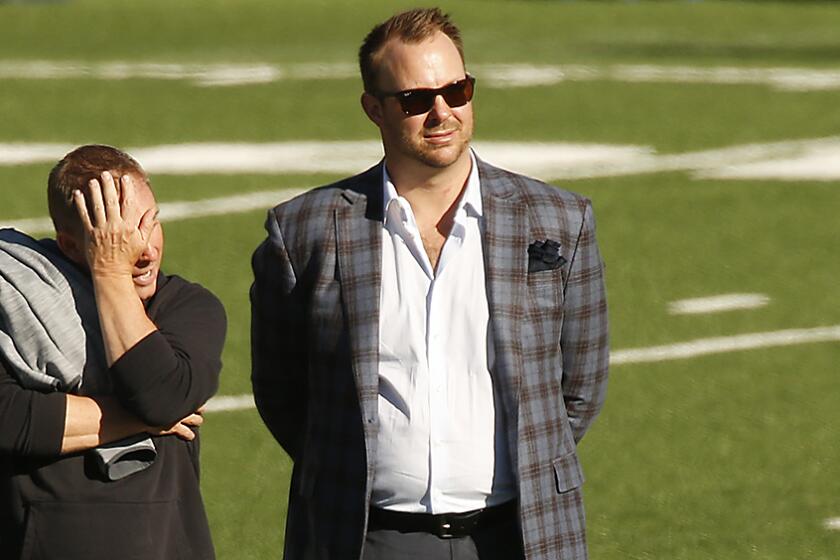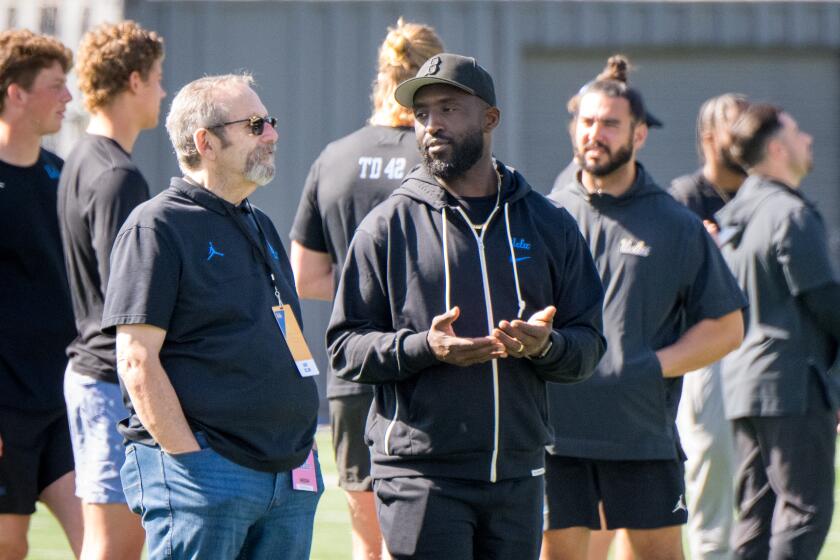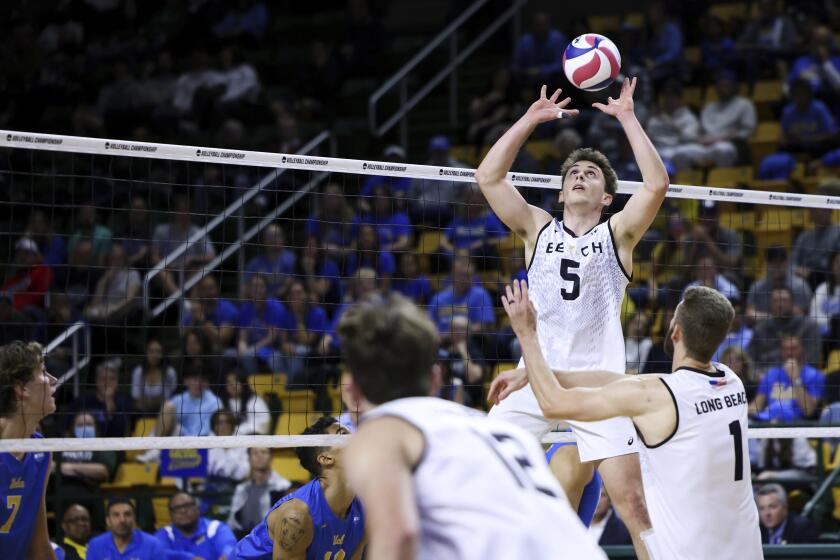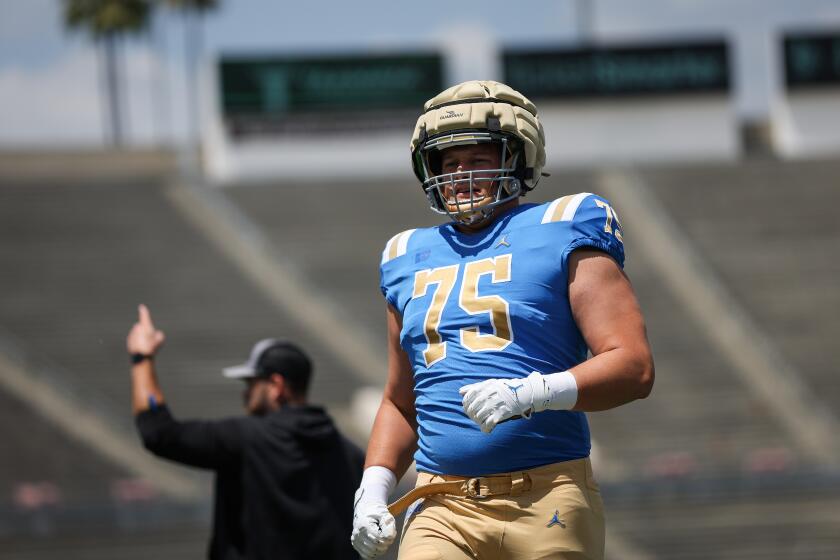In the Wizard’s Den : Wooden Working His Magic With Enchanted Youth
As the elderly man makes his way out of the gymnasium, he keeps an eye on the three-on-three basketball game in progress off to one side.
A rangy high school youth is slowly dribbling the ball about 10 feet from the basket, face to face with his slightly shorter defender.
The offensive player makes his move--quick, explosive, effective. He bursts past the defender and softly lays the ball into the basket.
As the elderly man walks, he speaks over his shoulder to the defender. “Never leave your feet on defense,” he says, “unless the ball is already in the air.”
The defender, just a youngster himself, nods his head respectfully and replies, “Sorry, Coach.”
Most people still call the old man “Coach.” Everybody still shows him respect.
It may be a dozen years since John Wooden retired from coaching basketball at UCLA, but time certainly hasn’t dimmed his accomplishments.
Seven NCAA championships in a row, 10 in 12 years. In this age of parity, such a dynasty seems almost incomprehensible. Yet Wooden thinks it could happen again.
“People say it’s crazy,” he says. “They feel there are too many good players around now. I think that’s a bunch of hooey. With so many good players around, if a coach gets a few of the right people, it’s going to happen.
“No one has a record like that without real good players. People always say it’s harder to stay on top than to get there. I never believed that. I think you learn a lot getting there. And that way, you can perpetuate yourself.”
Wooden won with superstars like Kareem Abdul-Jabbar (Lew Alcindor in those days) and Bill Walton, and he won with lesser talent. The mix was what kept him on top.
“If we hadn’t won in ’64 and ‘65,” he says, “would Alcindor have come to UCLA? I don’t think he would have. No question about that. If we hadn’t built Pauley Pavilion after our previous successes, would he have come? I think not.
“I don’t think he would have come if we were still practicing on the third floor of the men’s gym. Over here, we had the gymnastics team working out. Over there was the wrestling team. And in another area of the same gym was a trampoline. I practiced that way for 17 years.”
Wooden still is hanging around gyms these days. At 77, the Wizard of Westwood is now the Sorcerer of Summer Camps. He runs his own four-week camp at Cal Lutheran and spent this past week at Grant High, helping out at the Van Nuys-Sherman Oaks Basketball Fundamentals Camp.
His reasons for lending a hand in Van Nuys, not too far from his Encino home, are personal. Craig Impelman, head coach of that camp and an assistant at Weber State under Larry Farmer, is married to one of Wooden’s seven grandchildren.
Wooden’s favorite subject these days is the newest John in the family, the 15-month-old son of Craig and his wife, Christy, and one of Wooden’s two great-grandchildren.
“Taking a look at his size,” a beaming Wooden says of little John, “I think Terry Donahue will be calling on him in a few years.”
This is not a man who lives in the past. He is just as happy to talk about his great-grandchildren, just as eager to talk about the youngsters in his camp as he is about the Abdul-Jabbars and the Waltons.
“The game changes, but the fundamentals never do,” he says. “In my camps, I have certain principles I want taught. This is not for the star player. I like to work with the kids who wouldn’t have made the team without some help, who maybe wouldn’t have made the starting lineup otherwise.
“I’m not going to make a star out of somebody. The Lord gave them the equipment for that.
“I teach kids not to worry about things they have no control over. Just worry about those things you can control. You have control over your conditioning. You have no control over your height.”
Wooden still follows the college game, but he doesn’t like everything he sees.
“The thing that bothers me,” he says, “is that they are permitting the game to become too physical, too much like the pros. It’s a beautiful sport, a finesse game, but they are allowing physical strength to take over.
“In the pros, you look at people like Julius Erving and Magic Johnson, great and beautiful players. But they travel on every play. I talked to an official about it and he just shrugged and said it’s showmanship.”
The college game has undergone two major changes since the days Wooden strolled the sidelines.
“On the 3-point shot,” he says, “I’m not ready to make a judgment. I do think 19 feet, 9 inches is too close for the 3-point line. What I’d really like to see is the colleges back at 22 1/2 feet, and then move the pros from there out to 25 feet. That would be more realistic and more meaningful.
“As for the shot clock they’ve put in, that’s one of the best things that has happened to college basketball. It has eliminated the sometimes farcical games that have occurred when there have been stalls.
“You’re not going to get the 7-5 or the 3-2 games anymore. You’re not playing when you do that. The game was meant to be played. If you don’t want to play a game, don’t schedule it.”
There’s plenty wrong with the game away from the court. Stories of recruiting violations and drug problems surface constantly.
“There are problems in any era,” Wooden says. “People tell me there are problems I didn’t have to deal with. And I say, ‘Oh, you weren’t around in the ‘60s?’ You had the anti-establishment feeling running high with the Vietnam War. Walton and others taking over the administration building, stopping traffic.
“You don’t get away from problems. You just have different problems.”
In this era, a new problem bothers Wooden.
“The influence of television concerns me,” he says. “Because of television, some teams are playing up to 40 games now. That’s just too many. They’ve forgotten why they are in school in the first place. They are playing at every time of day. They are playing on Sundays, Mondays Tuesday, Wednesdays, Thursdays, Fridays and Saturdays. Some of those are school days, you know.”
Yet mention the event where he won his greatest glory--the NCAA Tournament--and he’d like to see it even bigger than its current 64-team field.
“I say let ‘em all in,” he explains. “You know, it was estimated that each of the teams in the Final Four last year made about $1 million dollars.
“What they ought to do is to close the regular season one week earlier and start the NCAA Tournament with every school in there. One Friday and Saturday would cut the field down to 64. Then what you do is to take all the income from the tournament--TV, radio, the live gate, the parking, concessions, the whole works--pay your expenses, give the NCAA a percentage and then divide the rest into shares. Every team gets at least one share. If you win a game, you get another share and so on. Half the schools, those that lose in the first round, would get a minimum of $45,000 to $50,000. The winner would get something like $200,000. Many small schools could use $45,000 more than Indiana could use the more than one million it got last year. It seems the ones that need the money the most often get the least.”
But enough of such talk. Two small youngsters are meekly standing before Wooden, awaiting autographs.
The college game will have to solve its own problems. John Wooden has turned his attention to the next generation.
Go beyond the scoreboard
Get the latest on L.A.'s teams in the daily Sports Report newsletter.
You may occasionally receive promotional content from the Los Angeles Times.



